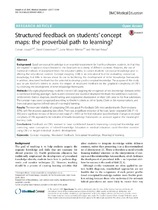Structured feedback on students’ concept maps: the proverbial path to learning?
Abstract
Good conceptual knowledge is an essential requirement for health professions students, in that they are required to apply concepts learned in the classroom to a variety of different contexts. However, the use of traditional methods of assessment limits the educator’s ability to correct students’ conceptual knowledge prior to altering the educational context. Concept mapping (CM) is an educational tool for evaluating conceptual knowledge, but little is known about its use in facilitating the development of richer knowledge frameworks. In addition, structured feedback has the potential to develop good conceptual knowledge. The purpose of this study was to use Kinchin’s criteria to assess the impact of structured feedback on the graphical complexity of CM’s by observing the development of richer knowledge frameworks. Fifty-eight physiotherapy students created CM’s targeting the integration of two knowledge domains within a case-based teaching paradigm. Each student received one round of structured feedback that addressed correction, reinforcement, forensic diagnosis, benchmarking, and longitudinal development on their CM’s prior to the final submission. The concept maps were categorized according to Kinchin’s criteria as either Spoke, Chain or Net representations, and then evaluated against defined traits of meaningful learning. The inter-rater reliability of categorizing CM’s was good. Pre-feedback CM’s were predominantly Chain structures (57%), with Net structures appearing least often. There was a significant reduction of the basic Spoke- structured CMs (P = 0.002) and a significant increase of Net-structured maps (P < 0.001) at the final evaluation (post-feedback). Changes in structural complexity of CMs appeared to be indicative of broader knowledge frameworks as assessed against the meaningful learning traits. Feedback on CM’s seemed to have contributed towards improving conceptual knowledge and correcting naive conceptions of related knowledge. Educators in medical education could therefore consider using CM’s to target individual student development.

